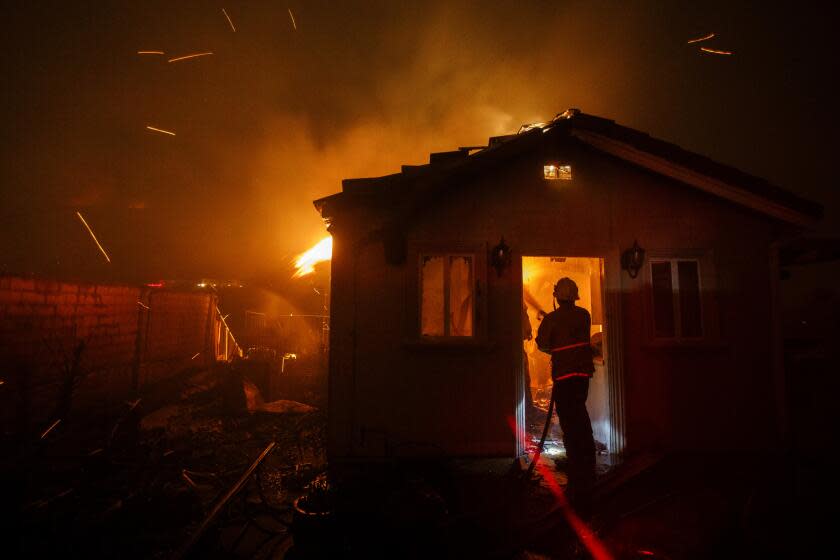State Farm won't renew 72,000 insurance policies in California, worsening the state's insurance crisis

The California homeowners' insurance crisis reached another critical stage this week when State Farm General Insurance announced that it would not renew policies for 72,000 property owners across the state.
The insurance giant announced Wednesday that it would not renew homeowner insurance policies for 30,000 customers, including owners of condominiums. It also plans not to offer commercial apartment policies and won’t renew the 42,000 now in place.
Although the number of people affected is large, the company said the cuts represent less than 3% of its policies in the state.
“This decision was not made lightly,” State Farm wrote in a statement. The company “takes seriously our responsibility to maintain adequate claims-paying capacity for our customers and to comply with applicable financial solvency laws. It is necessary to take these actions now.”
News of the cancellations did not sit well with the California Department of Insurance.
“One of our roles as the insurance regulator is to hold insurance companies accountable for their words and deeds,” said Deputy Insurance Commissioner Michael Soller. “State Farm General’s decision today raises serious questions about its financial situation — questions the company must answer to regulators.”
Read more: California's home insurer of last resort sees enrollment surge, raising concerns over its finances
State Farm's decision not to renew policies comes as thousands of Californians are finding it extremely difficult to insure their homes and commercial properties as companies increase rates, limit coverage or stop offering policies in areas increasingly susceptible to natural disasters.
The companies have cited high inflation, catastrophe exposure, reinsurance costs and the limitation of decades-old insurance regulations as reasons for scaling back policies in the state.
State Farm reported a net loss of $6.3 billion in 2023 compared to a net loss of $6.7 billion in 2022.
The lack of options has prompted thousands of Californians to purchase insurance from the FAIR Plan as a last resort. Funded by the insurers doing business in California, the Fair Access to Insurance Requirement plan provides more limited coverage as a fallback for property owners unable to find conventional policies they can afford.
But the enrollment surge is putting a financial strain on the state insurer as it faces a potential loss of $311 billion, up from $50 billion in 2018.
At a legislative hearing last week, Victoria Roach, president of the FAIR Plan Assn., warned lawmakers that the insurer of last resort had a surplus of only $200 million and was at risk of financial instability should a catastrophic event occur.
Read more: A major auto insurer returns to California — with a 30% price hike
“We grew another $10 billion in exposure in January and another $15 billion in February,” Roach told lawmakers. “So the numbers just continue to climb, which is a concern — as those numbers climb, our financial stability comes more in question and we come closer to an assessment of the market should we, knock on wood, have a catastrophe.”
“We’re one bad fire season away from complete insolvency — it feels like a big gamble in many ways,” said Assemblymember Jim Wood, a Democrat from Sonoma County. “If this were on Wall Street, I’m not sure you’d be able to get away with this.”
In response to the crisis, Insurance Commissioner Ricardo Lara has proposed a set of new rules that would allow insurers to raise rates to cover reinsurance costs and projected losses from catastrophic fires, but also require that they provide coverage for more homes in the canyons and hills. The proposals, which aim to move people off the FAIR plan and slow the increase in premiums, have won support from insurance industry trade groups and some consumer groups, but criticism from other consumer advocates such as Consumer Watchdog.
State Farm said it would continue to work with Lara, the governor’s office and policymakers to pursue the reforms in order to establish “an environment in which insurance rates are better aligned with risk.”
Karl Susman, an insurance expert, said the Department of Insurance needs to push forward the new regulations at a much faster rate to prevent companies from leaving the state.
“Even if it works out perfectly, you’re looking at every carrier having to now submit their new plans based on new rates and get them approved, and then they have to program them in their systems, then they have to roll it out to their clients and then they have to wait a year to get premiums based on those rates,” he said. “We’re talking about a long runway before these regulations will start having an impact.”
Read more: California insurer of last resort says it's not prepared for a big disaster
Susman hopes that the latest volley of State Farm cancellations will put more pressure on the Department of Insurance to speed up the process.
“It’s a tough, tough place for consumers right now, and my hope is that this will help expedite the department’s new regulations that it’s pushing out into being done maybe in weeks or the next month or two rather than slowly over the next eight months.”
State Farm said cancellation of policies will occur in the summer, starting with homeowner insurance on July 3, then commercial properties on Aug. 20.
This story originally appeared in Los Angeles Times.
